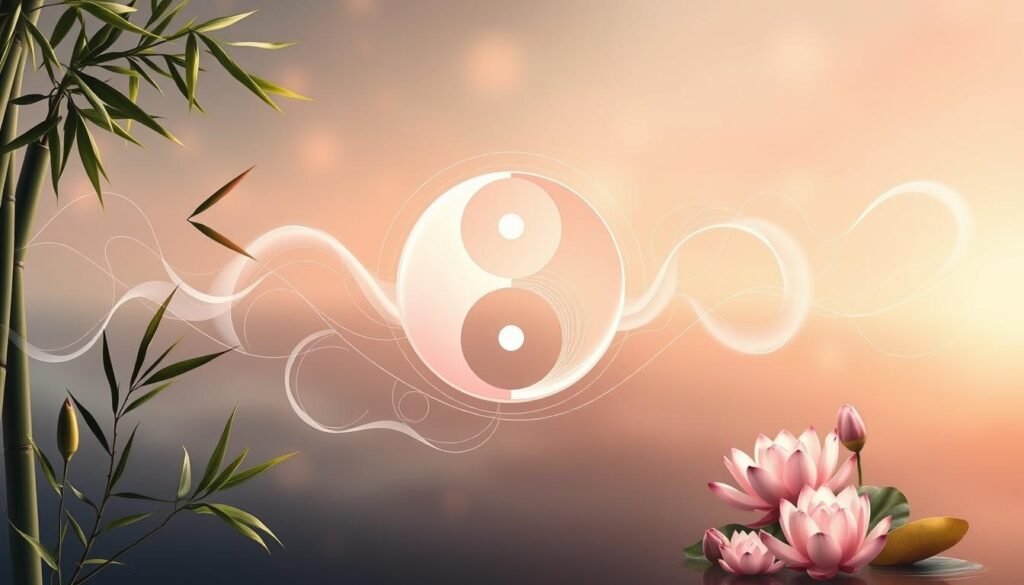The World Health Organization backs acupuncture to treat over 100 different conditions. These include depression. This age-old method gains attention for its role in mental health care, especially for women. Traditional treatments sometimes don’t fully meet emotional needs. That’s why many are now choosing acupuncture for depression and anxiety. Research shows it can really help with anxiety and mood disorders.
Acupuncture is a key part of Traditional Chinese Medicine. It focuses on rebalancing the body. By targeting specific points with slim needles, it aligns the body’s energy, known as Qi. The goal is to ease anxiety symptoms and boost overall health. This holistic approach is a breath of fresh air for those needing depression therapy without many side effects. It’s great for expectant moms and people on other meds.
Key Takeaways
- The World Health Organization endorses acupuncture for treating various conditions, including depression.
- Acupuncture can improve anxiety management and mental health outcomes in individuals.
- It is a safe alternative with minimal side effects, suitable for diverse populations including pregnant women.
- Over 10 million acupuncture treatments are administered annually in the United States.
- Patients often report immediate improvements in their symptoms after acupuncture sessions.
Understanding Depression and Anxiety
Depression and anxiety affect many people all over the world. It’s important to know the symptoms of these conditions. Knowing can really help improve someone’s life quality.
Common Symptoms of Depression
Depression affects both your body and mind. Some key depression symptoms include:
- Persistent sadness or low mood
- Loss of interest or pleasure in activities
- Insomnia or excessive sleeping
- Fatigue or decreased energy
- Changes in appetite or weight
- Irritability and frustration
- Thoughts of death or suicide
These symptoms can make everyday life and socializing very hard.
Recognizing Anxiety Symptoms
Anxiety makes people worry too much, affecting normal life. Common anxiety symptoms include:
- Excessive worrying about various aspects of life
- Restlessness or feeling keyed up
- Fatigue or being easily tired
- Irritability
- Difficulties with concentration or mind going blank
Anxiety also shows up as physical issues like a fast heartbeat and sweating.
The Impact on Mental Health
If not treated, depression and anxiety can cause serious mental health problems. The World Health Organization says nearly 5% of adults worldwide suffer from depression. Recognizing symptoms early and getting the right treatment is crucial.
Cognitive Behavioral Therapy and Mindfulness-Based Therapy are two methods that help. They’ve shown to be effective in treating these disorders.
The Traditional Chinese Medicine Perspective
Traditional Chinese medicine takes a broad view on mental health. It connects the body, mind, and spirit. At its heart is the idea of Qi, or life energy. This notion is key to linking emotional and mental health issues.
Concept of Qi and Its Role
Qi flows along paths in the body called meridians. For health and emotional balance, Qi must move freely. If Qi gets blocked or imbalanced, it can lead to mental health problems. This includes anxiety and depression. To help, TCM experts use methods like acupuncture to get Qi flowing right again.
How Imbalances Lead to Mental Health Issues
When Qi is off, it doesn’t just harm physical health. It affects mental well-being too. Things like constant emotional stress can mess up Qi’s flow. This makes people more likely to face anxiety and depression. TCM looks at each person’s unique situation. Then, it aims to fix these Qi imbalances.

| Imbalance Type | Impact on Qi | Potential Mental Health Manifestations |
|---|---|---|
| Emotional Stress | Stagnation | Increased anxiety |
| Chronic Fatigue | Deficiency | Depressive symptoms |
| Dietary Imbalance | Weakness | Mood swings |
| Environmental Factors | Blockage | Overwhelm |
By understanding how everything is connected in traditional Chinese medicine, experts can make personalized plans for those struggling with mental health issues. They concentrate on the idea of Qi. This helps them offer support for both emotional and mental healing. This creates a space for complete healing.
Acupuncture for Depression and Anxiety
More and more, studies show acupuncture might help with depression and anxiety. It’s becoming popular for easing symptoms in those who don’t find traditional therapies helpful. Research sees it as a helpful extra treatment, boosting results for people with mood disorders.
Research Supporting Acupuncture as an Effective Treatment
A 2018 review looked at 64 studies. It found acupuncture could somewhat ease depression more than fake treatments. Adding it to medication also greatly lowered depression symptoms. But, a 2020 analysis said acupuncture might make some antidepressants work better. Still, we need more studies to really trust acupuncture as a main treatment for mental health.
Study Results on Acupuncture and Mental Health
About one-third of people with depression face treatment-resistant depression (TRD), making recovery hard. Here, acupuncture offers hope. It shows big improvements in anxiety symptoms after eight sessions. Acupuncture also lowers stress hormones and ups happiness ones, making you feel better. Mostly, it’s safe with rare, mild side effects, like bruising or headaches. With newer studies showing good things, acupuncture looks promising for mental health struggles.

| Study Type | Findings | Notes |
|---|---|---|
| 2018 Review (64 studies) | Acupuncture slightly decreases depression severity | Compared to placebo treatments |
| Meta-analysis (2020) | Acupuncture may improve outcomes vs. antidepressants | Enhances effectiveness of some medications |
| Generalized Anxiety Disorder Study | Significant reduction in symptoms after 8 weeks | Focus on managing anxiety effectively |
The Mechanisms Behind Acupuncture
Exploring acupuncture shows a mix of biology and psychology at work. This old technique helps ease symptoms of depression and anxiety. By looking into how it works, we start to see its value for mental health.
How Acupuncture Works to Alleviate Symptoms
Acupuncture is famous for making the body release endorphins, natural substances that fight pain and boost happiness. It targets certain paths in the body to change mood and stress levels. Research shows acupuncture can make the brain more adaptable and reduce its inflammation. These benefits help people dealing with depression and anxiety.
Regulating the Internal Excesses and Deficiencies
In Traditional Chinese Medicine, balance in the body is key. Acupuncture helps by fixing imbalances in our systems. This is important for feeling emotionally stable.
Studies show it helps control neurotransmitters, helping improve mood and lessen anxiety. By keeping physical and emotional health in check, people feel much better overall.

Complementary and Alternative Medicine Approaches
There’s a growing trend towards using complementary medicine. It’s because people see the value in mixing alternative treatments with traditional ones. Adding acupuncture to usual therapies like psychotherapy and medication creates a full-circle healing process. This method may make treatments more effective, helping with depression and anxiety symptoms.
Integrating Acupuncture with Traditional Treatments
Many people are now adding alternative treatments to their mental health care. Studies show that adding acupuncture to standard treatments is helpful. It seems that acupuncture could help reduce symptoms if used with medication or therapy. This combined approach aims for a healthier state of mind.
Other Modalities of Holistic Healing
Besides acupuncture, there are many other holistic healing methods that work well with traditional treatments. These include:
- Herbal therapies: Some herbs are known to help with mental health.
- Lifestyle modifications: Improving your diet, exercise, and sleep can make a big difference.
- Meditation and mindfulness practices: These have helped people feel less anxious.
- Massage therapy: While it’s debated, some say it helps with anxiety and is part of complementary medicine.
Combining these methods with acupuncture can create a comprehensive plan. This plan helps those looking for emotional stability and better mental health.
Benefits of Acupuncture for Mental Well-Being
Acupuncture offers many benefits for those facing mental health issues like depression and anxiety. This ancient practice, with a rich history, is effective in supporting mental health. It helps reduce the symptoms of depression and eases anxiety.
Reduction in Depressive Symptoms
Studies show that acupuncture can lower depressive symptoms. For example, a study at the University of Arizona found significant improvement in people’s depression after eight weeks of acupuncture. This practice boosts endorphins and improves body functions, leading to better mental health.
Acupuncture not only improves mood but also helps physiologically. It enhances blood circulation and helps with hormone balance.
Managing Anxiety Effectively
Acupuncture is a great way to handle anxiety without medication. It reduces muscle tension, improves sleep, and lowers heart rate. These benefits are key for mental balance.
By decreasing cortisol levels and controlling stress responses, acupuncture supports lasting anxiety relief. It offers a path towards mental calmness.
| Benefits of Acupuncture | Effects on Mental Health |
|---|---|
| Stress Reduction | Lowered cortisol levels, improved relaxation. |
| Improvement in Depressive Symptoms | Notable decrease in severity, boosted mood. |
| Enhanced Sleep Quality | Better rest leading to improved cognitive functions. |
| Regulation of Heart Rate | Stabilization contributing to lower anxiety levels. |
| Pain Relief | Reduction in physical discomfort, aiding mental clarity. |
Who Can Benefit from Acupuncture Therapy?
Acupuncture therapy is great for many people, especially women who deal with anxiety and depression. It’s a holistic alternative to traditional medicine. Knowing how it helps different genders highlights its value in health care today.
Gender Disparities in Depression and Anxiety
Women are more likely to suffer from depression and anxiety than men. Acupuncture is effective for them by targeting these symptoms directly. It shows great promise in easing depression, offering a new hope for women.
Addressing gender differences in mental health is crucial for customized treatments.
Acupuncture for Pregnant Women
It’s important to treat depression during pregnancy safely. Many pregnant women worry about how medicines might affect their babies. Acupuncture is a safe way to handle stress and depression without medication.
It can improve emotional health and reduce medication risks. This helps expectant mothers fight anxiety and depression, leading to a healthier pregnancy.
Addressing Coexisting Conditions like Chronic Pain
Acupuncture works well for those with chronic pain and depression. Chronic pain can make depression worse, but acupuncture helps with both. It not only reduces pain but also improves mental health.
This approach supports traditional treatments, adding value to them. People struggling with both issues can see big improvements. For more details, visit acupuncture’s impact on mental health.
Choosing the Right Acupuncturist
Finding a skilled acupuncturist is key to getting the best results. The skill level of the practitioner can greatly affect your treatment’s success. When selecting, focus on their acupuncture certification and training. This ensures they use safe and effective methods tailored to your needs.
Importance of Certification and Training
Acupuncturists must have proper accreditation, usually from completing an in-depth post-graduate program. Most states also demand they clear the National Certification Commission for Acupuncture and Oriental Medicine exam. Their education covers many treatment methods, safety, and patient care. Acupuncture certification is crucial for choosing the right acupuncturist. It confirms that the person has the needed education and training.
Questions to Ask Before Treatment
When starting acupuncture therapy, here are questions for the practitioner:
- What are your qualifications and certifications?
- How many sessions do you recommend for my condition?
- What techniques do you usually use?
- Have you worked with conditions like mine before?
- What safety measures do you follow to keep the treatment area clean?
Asking these questions helps you understand the practitioner’s experience and style. This information is key to building trust with your acupuncturist and improving your therapy. For more details on acupuncture and its benefits, check out the Johns Hopkins Medicine website.
Conclusion
Acupuncture is becoming well-known for its benefits in mental health. It’s particularly noted for treating anxiety and depression. Studies show it can really help. They’ve found it often works better than regular care or fake treatments. This shows its strong potential for helping people recover.
Acupuncture treats the whole person, not just symptoms. This is important for mental health care. It’s a safe option that can also go along with other treatments. Using acupuncture can give people a better way to handle their mental health. This is crucial as depression leads in causing disability worldwide. Adding acupuncture to treatment plans may improve results for many.
People looking for alternative mental health treatments might consider acupuncture. There’s strong evidence that it’s beneficial. Acupuncture could be key in a complete approach to better mental health. It helps in tackling the growing issues of anxiety and depression.